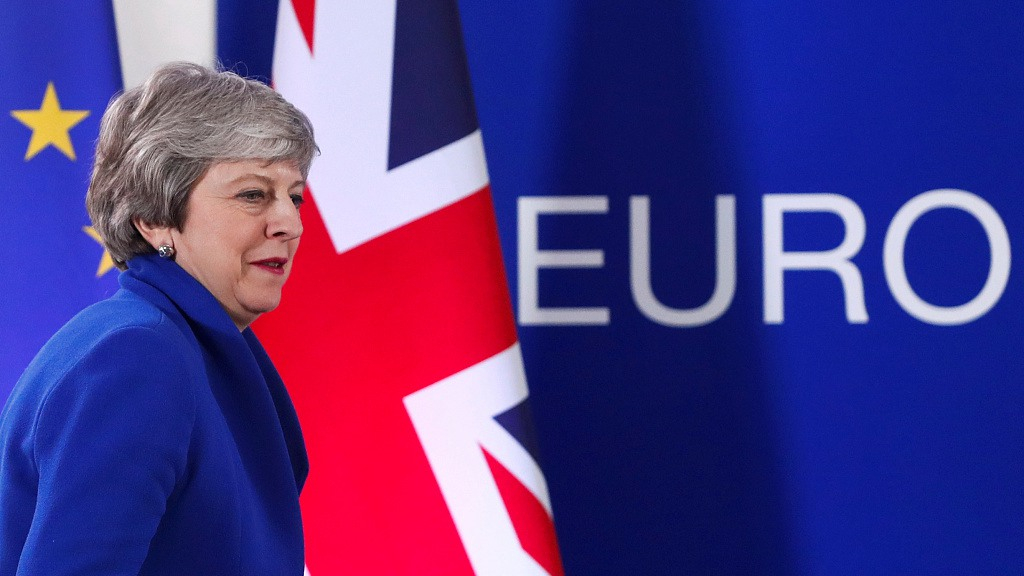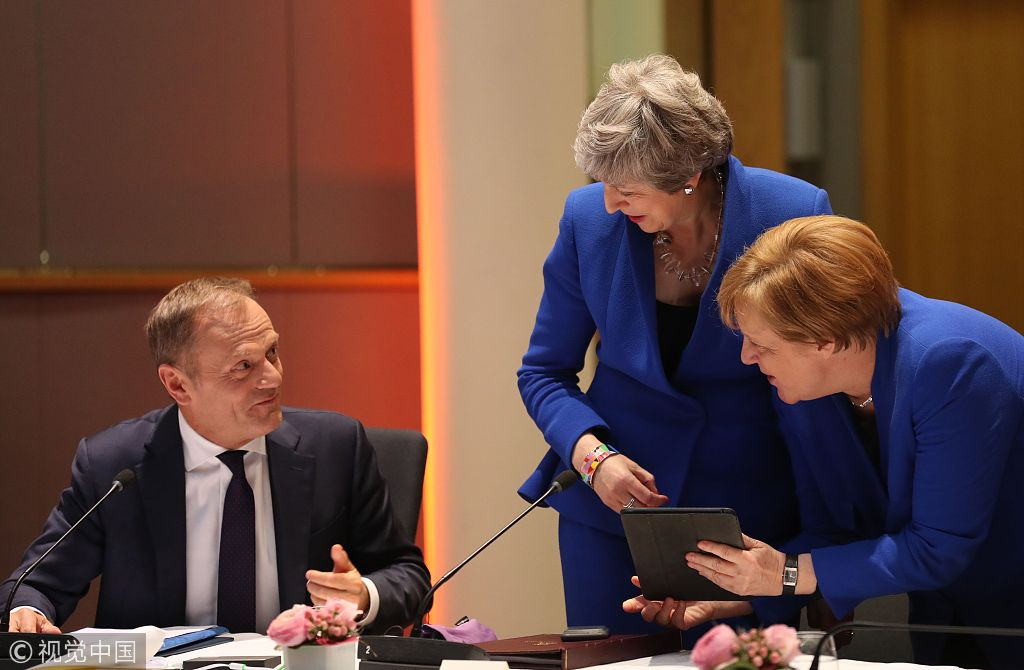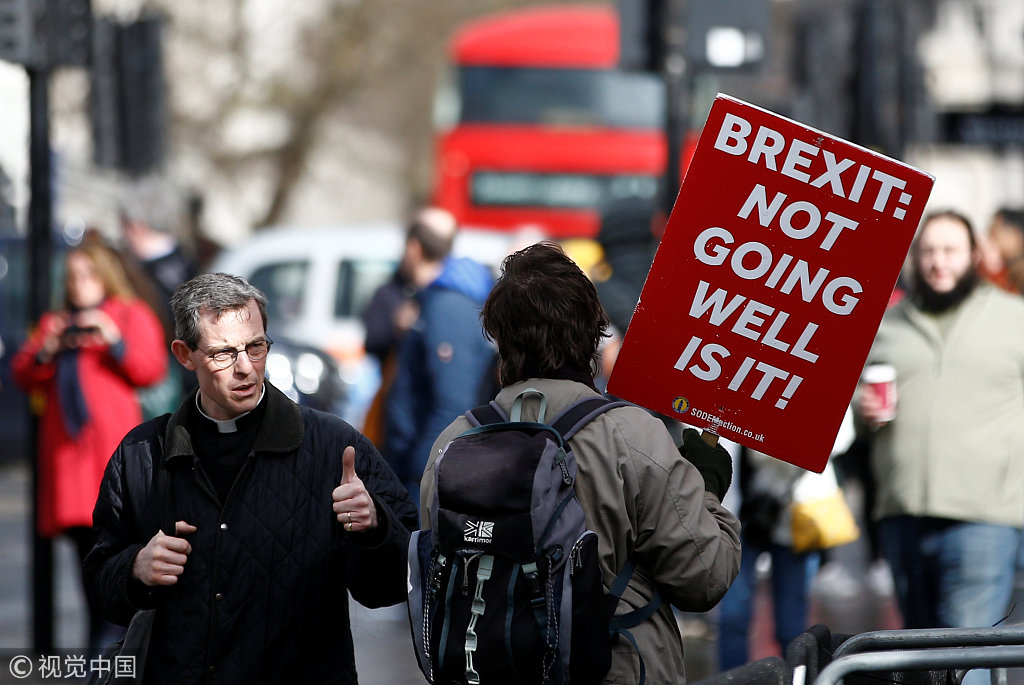
Opinion
11:32, 11-Apr-2019
The ball is back in Theresa May's court, but now what?
Tom Fowdy

Editor's note: Tom Fowdy is a British political and international relations analyst and a graduate of Durham and Oxford universities. He writes on topics pertaining to China, the DPRK, Britain, and the United States. The article reflects the author's opinion, and not necessarily the views of CGTN.
On Wednesday evening the European Council convened an emergency summit to address Brexit, following Theresa May's appeal to the bloc for an exit extension following her inability to get a deal through the House of Commons. Although the prime minister had requested a "short extension" up until the end of June, the summit settled on a compromise and agreed to the extension of Article 50 until October 31, with the option of a "review" in June, and thus a potential early departure, if political circumstances permit.
The announcement is a blow to the British prime minister who has been hoping to avoid participation in the European Elections. However, owing to the obvious failure to reach a domestic agreement on the deal, the idea a shorter deadline could be so easily tolerated was naive on her behalf. Now, the ball is back in her court. The continent is requiring action on her behalf, if anything a solid plan and commitment on what Britain will do next. If she cannot make any leeway on winning consensus for her deal, then Downing Street must do the honorable thing and use the time available to either call a general election or submit to a second vote.

Britain's Prime minister Theresa May (C) and Germany's Chancellor Angela Merkel (R) look at a tablet, next to European Council President Donald Tusk (L) ahead of a European Council meeting on Brexit at The European Parliament in Brussels, April 10, 2019. /VCG Photo
Britain's Prime minister Theresa May (C) and Germany's Chancellor Angela Merkel (R) look at a tablet, next to European Council President Donald Tusk (L) ahead of a European Council meeting on Brexit at The European Parliament in Brussels, April 10, 2019. /VCG Photo
Why has the European Union pushed for a longer extension? The key answer is: uncertainty without any kind of feasible solution in the wings. May's bid to ask for a shorter extension up until June was baffling, simply because it was void of any kind of political or strategic logic. The prime minister has repeatedly failed in getting her own party and other British lawmakers to support her agreement. What is more staggering is the total absence of any kind of backup plan and her insistence upon the initial option of which is widely unpopular.
Given this, EU leaders were never about to buy such empty proposals owing to the obvious instability and risk what they pose to the continent. A scenario whereby Brexit is merely extended again and again and again is disastrous. Therefore, October 31st has been assigned the new deadline -- with the pragmatic compromise that June is possible if circumstances permit.
But it is not, however, a deadline which is being assigned softly. In offering her such an extension, the European Union is now placing strong obligations upon the prime minister to act within that time frame. There must be a plan and a solution in the wings. On their behalf, it has been made clear and again that what is being offered cannot be increased. Forming a unified, bloc-wide approach, there is no room to renegotiate on more favorable terms. May's behavior on the domestic level clearly indicates this reality, yet such cannot compensate for the clear lack of leadership and unwillingness to explore alternative options from her own side. Nevertheless, she must recognize now that simply spending from April to October squatting on her current withdrawal agreement will produce nothing new. It is already been made quite clear that attempting to get the Labour Party on board is a non-starter.

An anti-Brexit protester walks outside the Houses of Parliament in London, Britain, March 14, 2019. /VCG Photo
An anti-Brexit protester walks outside the Houses of Parliament in London, Britain, March 14, 2019. /VCG Photo
So that begs the question, what now? The increased scope of time gives her space to explore options, which might not be favorable but may ultimately prove to be necessary.
Because Parliament is never going to agree to her deal, such options should include a general election or if necessary, a 2nd referendum. Both, of course, are huge risks which may undermine and defeat the prime minister altogether, but in the greater perspective of the national good, they are now the only means necessary by which Britain can break the political deadlock and come to a decisive conclusion on what Brexit ought to consist of, with the political capital to actually achieve something meaningful. There is also the option of Theresa May stepping down altogether and making for a new and more inspiring leader. If she is not willing to consider any of these things, then there can't really be any progress.
The Brexit ball is now firmly placed in her court. The country's fate now comes down to her choices and decisions alone. In which case, the obstacle to either a Brexit, or no Brexit for that matter, is in fact her herself. If she is not prepared to act now with courage, decisiveness and the willingness to sacrifice her own position, then this new extension will only prove to be a greater waste of time. Europe is watching, and so of course is the public.
(If you want to contribute and have specific expertise, please contact us at opinions@cgtn.com)

SITEMAP
Copyright © 2018 CGTN. Beijing ICP prepared NO.16065310-3
Copyright © 2018 CGTN. Beijing ICP prepared NO.16065310-3